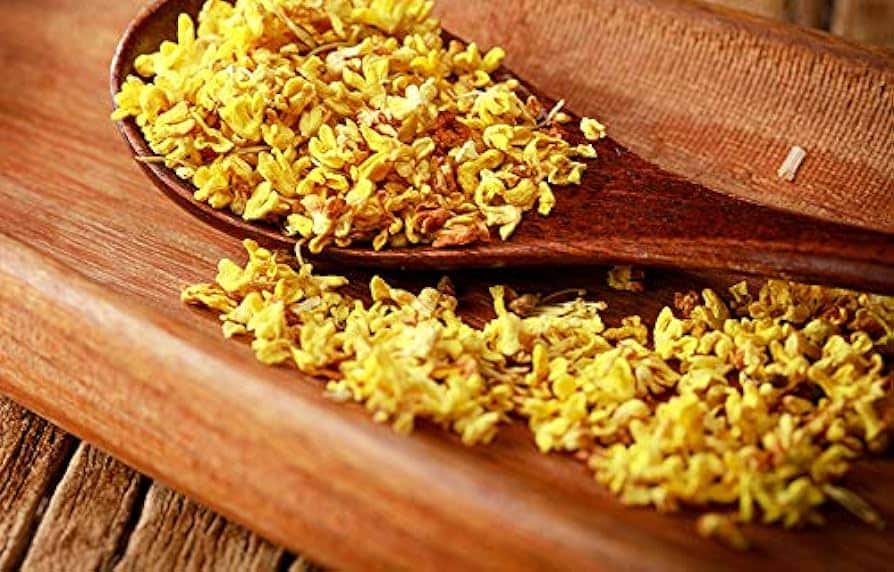What are the benefits of eating osmanthus flower?

Osmanthus, a delicate flower known for its sweet fragrance and subtle flavor, holds a treasure trove of benefits for both culinary enthusiasts and health-conscious individuals. From its traditional use in teas and desserts to its therapeutic properties, osmanthus offers a myriad of advantages that enhance overall well-being. Let’s delve into the remarkable benefits of incorporating osmanthus into your diet and lifestyle.
Culinary Versatility of Osmanthus:
Osmanthus flowers, prized for their delightful aroma and floral notes, are a beloved ingredient in various culinary traditions, particularly in East Asia. These fragrant blossoms are commonly used to infuse teas, wines, syrups, desserts, and savory dishes with their unique flavor profile. Osmanthus tea, brewed from dried osmanthus flowers, offers a soothing and aromatic beverage that calms the senses and rejuvenates the spirit. The subtle sweetness and delicate fragrance of osmanthus make it a versatile ingredient in desserts, where it adds a touch of elegance and charm to cakes, puddings, jellies, and pastries.
Rich in Antioxidants:
One of the key benefits of consuming osmanthus is its high antioxidant content. Antioxidants are compounds that help neutralize harmful free radicals in the body, protecting cells from oxidative damage and reducing the risk of chronic diseases such as heart disease, cancer, and diabetes. Osmanthus flowers contain a variety of antioxidants, including flavonoids, phenolic acids, and vitamins, which contribute to their therapeutic properties and health benefits. Regular consumption of osmanthus-infused teas or desserts can help boost antioxidant levels in the body, promoting overall health and well-being.
Anti-inflammatory Properties:
In addition to its antioxidant properties, osmanthus is also believed to have anti-inflammatory effects, which can help reduce inflammation and alleviate symptoms of inflammatory conditions such as arthritis, asthma, and inflammatory bowel disease. The flavonoids and phenolic compounds found in osmanthus flowers possess anti-inflammatory properties that help modulate the body’s immune response and reduce the production of pro-inflammatory cytokines. Incorporating osmanthus into your diet as a tea or culinary ingredient may help support overall joint health and reduce the risk of chronic inflammation-related diseases.
Digestive Support:
Osmanthus has long been valued in traditional Chinese medicine for its digestive benefits. The aromatic compounds found in osmanthus flowers stimulate the production of digestive enzymes and bile, promoting efficient digestion and nutrient absorption. Osmanthus tea is often consumed after meals to aid digestion and alleviate symptoms of bloating, indigestion, and gastrointestinal discomfort. The gentle fragrance and soothing properties of osmanthus help relax the digestive tract and alleviate digestive disturbances, making it a popular choice for digestive support and overall gut health.
Stress Reduction and Relaxation:
The delicate fragrance of osmanthus flowers has a calming and soothing effect on the mind and body, making it an ideal choice for relaxation and stress reduction. Osmanthus-infused teas or desserts can help promote feelings of tranquility and well-being, reducing stress and anxiety levels. The aroma of osmanthus stimulates the production of neurotransmitters such as serotonin and dopamine, which are associated with feelings of happiness and relaxation. Sipping on a warm cup of osmanthus tea or indulging in osmanthus-flavored desserts can create a serene and peaceful atmosphere, allowing you to unwind and de-stress after a long day.
Respiratory Support:
Osmanthus is often used in traditional herbal medicine to support respiratory health and alleviate symptoms of respiratory conditions such as coughs, colds, and bronchitis. The aromatic compounds found in osmanthus flowers have expectorant properties that help loosen mucus and phlegm, making it easier to expel from the respiratory tract. Osmanthus tea, when consumed regularly, can help soothe sore throats, reduce coughing, and promote respiratory comfort. The gentle aroma of osmanthus also helps clear nasal passages and ease congestion, providing relief from respiratory symptoms.
Skin Health and Beauty:
Osmanthus flowers are not only beneficial when consumed internally but also offer skincare benefits when used topically. The antioxidant-rich properties of osmanthus help protect the skin from environmental stressors and premature aging by neutralizing free radicals and preventing oxidative damage. Osmanthus-infused skincare products such as oils, creams, and serums help hydrate, nourish, and rejuvenate the skin, leaving it soft, supple, and radiant. The delicate fragrance of osmanthus provides a sensory indulgence that uplifts the spirits and enhances overall well-being.
Embracing the Gifts of Osmanthus
In conclusion, osmanthus flowers offer a multitude of benefits for both culinary enjoyment and therapeutic purposes. From their antioxidant-rich properties to their digestive support and stress-reducing effects, osmanthus embodies a holistic approach to health and wellness. Whether enjoyed as a fragrant tea, infused into desserts, or used in skincare products, osmanthus delights the senses and nourishes the body, mind, and soul. Embrace the gifts of osmanthus and experience the transformative power of this exquisite flower in your daily life.
FAQ:
1. What is osmanthus, and what does it taste like?
- Osmanthus is a fragrant flower native to East Asia, known for its sweet aroma and subtle floral flavor reminiscent of apricots or peaches.
2. How do I use osmanthus flowers in cooking?
- Osmanthus flowers can be used to infuse teas, desserts, wines, and savory dishes with their delicate fragrance and flavor, adding a touch of elegance to culinary creations.
3. Are osmanthus flowers edible?
- Yes, osmanthus flowers are edible and commonly used in culinary applications, particularly in teas and desserts, for their aromatic properties.
4. Can osmanthus tea be served hot and cold?
- Yes, osmanthus tea can be enjoyed hot or cold, depending on personal preference. It offers a soothing beverage option that can be enjoyed year-round.
5. Are there any health benefits associated with osmanthus consumption?
- Osmanthus flowers contain antioxidants and are believed to have anti-inflammatory properties, potentially offering health benefits such as reducing oxidative stress and inflammation.
6. Where can I purchase osmanthus flowers for culinary use?
- Osmanthus flowers can be found in specialty Asian grocery stores, herbal shops, and online retailers that offer dried herbs and botanicals for culinary purposes.
7. Can osmanthus flowers be used in vegan or vegetarian recipes?
- Yes, osmanthus flowers are plant-based and can be used in a variety of vegan and vegetarian recipes to add a delicate floral note and enhance the overall flavor profile.
8. What desserts pair well with osmanthus tea?
- Osmanthus tea pairs well with a variety of desserts, including light pastries, fruit tarts, and creamy puddings, complementing their sweetness with its delicate floral aroma.
9. How should osmanthus flowers be stored for culinary use?
- Dried osmanthus flowers should be stored in an airtight container in a cool, dry place away from direct sunlight to maintain their fragrance and flavor for culinary applications.
10. Are there any traditional Asian dishes that prominently feature osmanthus flowers?
- Yes, traditional Asian desserts such as osmanthus jelly, osmanthus cake, and osmanthus rice wine often feature osmanthus flowers prominently, showcasing their delicate aroma and subtle sweetness.
Related Posts
Osmanthus flowers in floral-scented dishes?
-
Posted by
akshita aishwarya
- 1 comment



